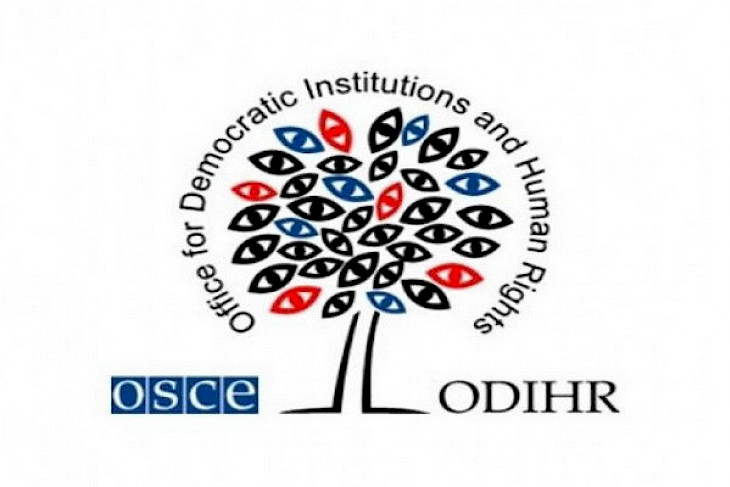ID :
637592
Mon, 08/08/2022 - 11:30
Auther :
Shortlink :
http://m.oananews.org//node/637592
The shortlink copeid
OSCE/ODIHR NAM recommends sending a mission to observe the constitutional referendum in Uzbekistan

Needs assessment mission of the Office for Democratic Institutions and Human Rights of the Organization for Security and Cooperation in Europe (OSCE/ODIHR NAM), which traveled to Uzbekistan on 19-21 July in accordance with its mandate and awaiting an official invitation published an interim report to monitor the constitutional referendum in Uzbekistan, Dunyo news agency reported.
Based on this assessment, the NAM recommends whether an ODIHR observation activity for the forthcoming referendum should be established and, if so, what type of activity best fits the needs identified. Meetings were held with officials of state institutions, and media representatives.
The document notes that the ODIHR expresses its gratitude to the Ministry of Foreign Affairs for assistance and cooperation in organizing the visit.
Representatives of the mission noted that after the announcement of the referendum, the process of public consultations was extended twice and ended on 1 August. After a period of public consultations, the Constitutional Commission will finalize the draft amendments and submit a new draft text for approval by both houses of parliament, after which a referendum date will be set.
It is emphasized that many interlocutors of ODIHR NAM welcomed the proposed amendments as an improvement.
At the same time, a referendum may be appointed by the Oliy Majlis on the basis of proposals from citizens, chambers of the Oliy Majlis or the President. The results of the constitutional referendum are binding. To amend the constitution in a referendum, a turnout threshold of 50% of all registered voters applies, and more than half of the valid votes must be cast in favor of the amendments. According to the CEC, voters will be asked a single question "Yes" or "No" about the approval of the entire package of constitutional changes.
It is noted that referendums are regulated primarily by the 1992 Constitution, the 1991 Referendum Law and the 2019 Electoral Code. The Referendum Law was last amended in March and June 2022, and the changes mainly reflect the changes made to the Electoral Code in 2019 and 2021, including improving the efficiency of the referendum dispute resolution process, introducing the neutrality requirement for members of lower commissions, a change in the procedure for voting abroad, as well as a number of technical adjustments. The Law on Referendum contains the main provisions on holding a referendum, including the structure, voters. Most interlocutors of ODIHR NAM did not express concerns about the accuracy of the voter list.
It is stated that all expenses related to the organization of the referendum are covered by the state budget. According to the law, public associations, enterprises, legal entities and citizens can donate funds for holding a referendum to the CEC.
It is noted that preparations for the referendum continue, and at the moment the CEC has adopted five rules regarding the holding of the referendum. The Central Election Commission, together with other state institutions, intends to conduct a comprehensive interactive cascade training for members of referendum commissions of all levels.
International observers must be accredited by the Central Election Commission, the rest are subject to accreditation in district referendum commissions.
All ODIHR NAM interlocutors noted the importance of independent monitoring of the referendum process and stressed the need for ODIHR monitoring activities. Most interlocutors stressed the vital role of the ODIHR in Uzbekistan’s efforts to meet its human rights obligations and noted the support that the ODIHR provides to government agencies. While recent amendments to the legal framework did not address issues previously noted by ODIHR regarding election day and vote counting, most ODIHR NAM interlocutors did not express concerns about these issues for the referendum. However, they emphasized the need to deploy a referendum observation mission with a long-term presence to cover the regional aspects of the process, in particular, the implementation of the regulatory framework, the conduct and preparation for the referendum by the referendum administration, and media coverage of the referendum.
On this basis, the ODIHR NAM recommended that a Limited Referendum Observation Mission (LROM) be sent to observe the constitutional referendum. In addition to the NAM core team of experts, ODIHR recommends that 14 long-term observers from OSCE participating States be seconded to observe the referendum process throughout the country. In accordance with standard methodology, the ODIHR LEOM will include an element of media monitoring. Although the mission will visit a limited number of polling stations, no systematic observation of the voting process is envisaged.





